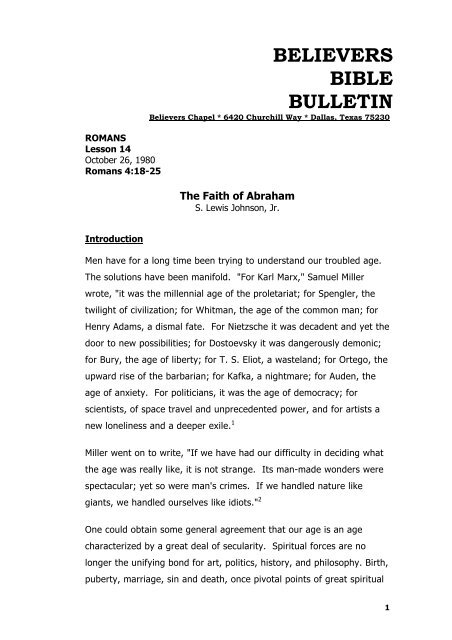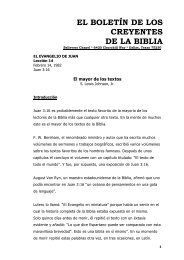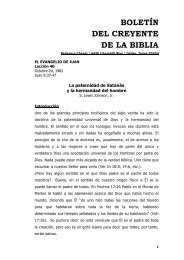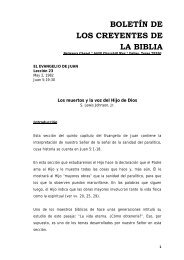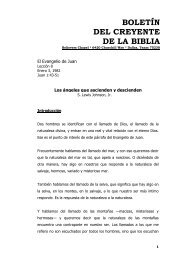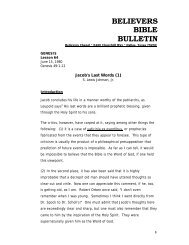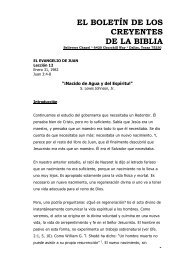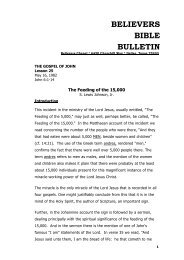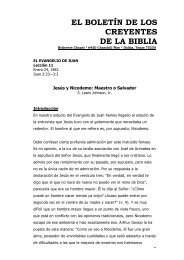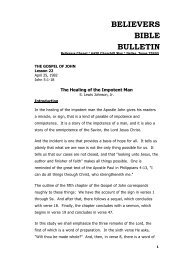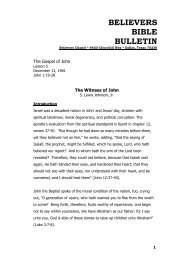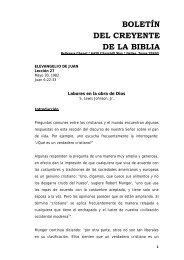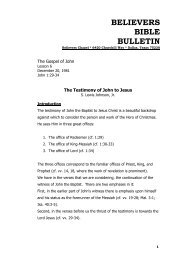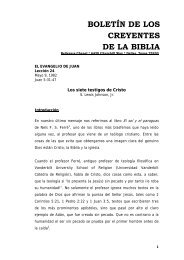Romans 4:18-25 - Believers Chapel
Romans 4:18-25 - Believers Chapel
Romans 4:18-25 - Believers Chapel
You also want an ePaper? Increase the reach of your titles
YUMPU automatically turns print PDFs into web optimized ePapers that Google loves.
ROMANS<br />
Lesson 14<br />
October 26, 1980<br />
<strong>Romans</strong> 4:<strong>18</strong>-<strong>25</strong><br />
BELIEVERS<br />
BIBLE<br />
BULLETIN<br />
<strong>Believers</strong> <strong>Chapel</strong> * 6420 Churchill Way * Dallas, Texas 75230<br />
The Faith of Abraham<br />
S. Lewis Johnson, Jr.<br />
Introduction<br />
Men have for a long time been trying to understand our troubled age.<br />
The solutions have been manifold. "For Karl Marx," Samuel Miller<br />
wrote, "it was the millennial age of the proletariat; for Spengler, the<br />
twilight of civilization; for Whitman, the age of the common man; for<br />
Henry Adams, a dismal fate. For Nietzsche it was decadent and yet the<br />
door to new possibilities; for Dostoevsky it was dangerously demonic;<br />
for Bury, the age of liberty; for T. S. Eliot, a wasteland; for Ortego, the<br />
upward rise of the barbarian; for Kafka, a nightmare; for Auden, the<br />
age of anxiety. For politicians, it was the age of democracy; for<br />
scientists, of space travel and unprecedented power, and for artists a<br />
new loneliness and a deeper exile. 1<br />
Miller went on to write, "If we have had our difficulty in deciding what<br />
the age was really like, it is not strange. Its man-made wonders were<br />
spectacular; yet so were man's crimes. If we handled nature like<br />
giants, we handled ourselves like idiots." 2<br />
One could obtain some general agreement that our age is an age<br />
characterized by a great deal of secularity. Spiritual forces are no<br />
longer the unifying bond for art, politics, history, and philosophy. Birth,<br />
puberty, marriage, sin and death, once pivotal points of great spiritual<br />
1
significance, are now natural, biological, social, and primarily clinical.<br />
As for advertising, it is the religious expression of the secularity of the<br />
age, placarding the superficial glory of the material products of our<br />
age. No longer are we to be saved by grace; we are to be saved by<br />
gadgets, which become ours by the sufferings of monthly payments.<br />
In this way we may expect, so we are told, to lose our money but gain<br />
our soul. Miller is right, "Salvation was never more ardently proffered<br />
by the church in its most fervent evangelism to save the world than it<br />
is now by frenetically hepped-up hucksters, who promise the full<br />
delight of heaven to those who are bored in their chrome-plated hell,<br />
by giving them more of the same sort of thing." 3 The sad thing about<br />
it is that now the evangelists of a fairly orthodox gospel (but generally<br />
Arminian, not the pure gospel of sovereign grace) are using the same<br />
methods, deceiving the simple-minded saints and extracting from them<br />
their giant sums of money for their evangelical conglomerates. How<br />
gullible the saints are!<br />
Is there a way out Abraham lived in an advanced civilization, one<br />
that was quite sure that it had the answers. Had they not been so<br />
sure of themselves, that years before they had built a tower to<br />
proclaim their self-sufficiency They desired to make their name great,<br />
at the expense of the name of the Lord God. It was, however, to their<br />
own destruction, but man never learns the truth about himself without<br />
the efficacious grace of the Holy Spirit. It is, therefore, very likely that<br />
the patriarch lived in the midst of great ungodliness, yet he became<br />
great in the eyes of the Lord God (cf. Josh. 24:2-3; Gen. 12:2), and in<br />
the eyes of the leaders of the great religions of the earth (cf. Matt.<br />
3:9; Gal. 3:29}.<br />
Where did Abraham find the unifying center of life The raison d'etre<br />
of life What was the secret of this eminent Bedouin chief who<br />
thousands of years ago wandered from pasture to pasture over the<br />
valleys and plains of the East, looking for the land and the life that the<br />
Lord God had promised him That secret is the subject of the verses<br />
to which we now turn in our study of Paul's Letter to the <strong>Romans</strong>.<br />
2
Really the answer is not difficult to understand; it is only difficult to<br />
practice. Abraham's secret was the life of faith in the Word and<br />
character of God. The nature of that faith is before us in <strong>Romans</strong><br />
4:<strong>18</strong>-<strong>25</strong>.<br />
THE NATURE OF ABRAHAM'S FAITH<br />
Its impediments (Rom. 4:<strong>18</strong>-19). The apostle in the preceding<br />
verses of the fourth chapter, a chapter in which he seeks to<br />
demonstrate that the Old Testament men were justified in the same<br />
way that New Testament men are, his great illustration being the<br />
patriarch Abraham. Having very cogently made his point, it would be<br />
expected that someone should say to him, "But, Paul, just exactly what<br />
is saving faith You say a man is justified by faith, not by the works of<br />
the Law. But what do you mean by 'faith.' Just what is the kind of<br />
faith that justifies" This question the apostle seeks to answer in the<br />
last section of <strong>Romans</strong> four. His answer is, very simply, that faith is<br />
unswerving trust in the God of the resurrection. That, too, was the<br />
essence of Abraham's trust (cf. v. 17; Acts 27:<strong>25</strong>).<br />
A brief review of Abraham's history might be helpful at this point. At<br />
age 70 the God of glory had appeared to him and called him to go out<br />
to an unknown land. His name at the time was Abram, which means<br />
something like exalted father. He and his wife Sarah had no children,<br />
which would have been a constant source of embarrassment to him in<br />
the new land. Living as he came to live, in the place where camel<br />
caravans were continually passing, he was exposed to the usual<br />
oriental palaver and inquisitiveness concerning matters that seem quite<br />
personal to us. They had often asked him about his family, wife and<br />
children, especially in the light of his name. Behind his back they had<br />
often commented upon the humor of the situation -- a man named<br />
exalted father who had no children at all. Abram had had to bear the<br />
concealed ridicule for a long time.<br />
3
Finally, at age 86 at the goading suggestion of his wife he had taken to<br />
himself her handmaid, Hagar, and a son had been born, Ishmael. Now<br />
all the members of the family knew where the problem lay.<br />
Finally, at age 99 the Lord appeared again to Abram and renewed the<br />
covenantal promises and gave him the sign of the covenant, the rite of<br />
circumcision. At the same time he told Abram that the promised seed<br />
would come from the womb of Sarah. In token of the situation Abram<br />
was given a new name, Abraham, meaning father of a multitude. To<br />
understand the uproarious humor of the situation let us listen to<br />
Barnhouse, "There are some things in the Bible that cause me to<br />
chuckle. I cannot help but think of what must have happened when<br />
Abraham broke the news to his family and servants that he was now<br />
changing his name. They all knew that his former name was Abram,<br />
father of many, and they knew it had been somewhat of a thorn to<br />
him. So we can imagine the stir of interest and curiosity when he<br />
announced, 'I am going to change my name.' Were there some who<br />
said to themselves with a laugh, 'The old man couldn't take it. It<br />
finally got under his skin. After all, to be the father of nobody for<br />
eighty-six years, and then to be the father of only one, with a name<br />
like he has— father of many—must have its rough moments. So he is<br />
going to change his name. I wonder what it will be’<br />
"And then the old man spoke. 'I am to be known as Abraham--father<br />
of a multitude.' We can almost hear the silence of the stunned<br />
moment as the truth breaks upon them. Father of a multitude Then<br />
the laughter broke forth behind the scenes. 'The old man has gone<br />
crazy. He had one child when he was eighty-six, and now at ninetynine<br />
he is beginning to get ideas.' Father of a multitude! Was there<br />
ever anything more ridiculous for a man of his age" 4<br />
Well, of course, it was ridiculous, humanly speaking, but in divine<br />
things we shouldn't think and speak like humans. It is true, as I<br />
believe Luther said, our thoughts of God are too often too human. We<br />
4
must always remember that the foolishness of God is wiser than men,<br />
and the weakness of God is stronger than men (cf. 1 Cor. 1:<strong>25</strong>).<br />
Abram had begotten Ishmael in the power of his humanity, but he was<br />
to beget Isaac in the power of the resurrection that God wrought in his<br />
being. Just as He had said at the creation, "Let there be light," and<br />
light broke forth amidst the chaotic matter (cf. Gen. 1:3), so would He<br />
say, "Let there be Isaac," and Isaac, the child of the promise, would<br />
come through Abraham and Sarah, when their bodies were physically<br />
dead so far as generation was concerned.<br />
The impediments to Abraham's faith were large and imposing. Paul<br />
puts them in this way, "Who against hope believed in hope, that he<br />
might become the father of many nations, according to that which was<br />
spoken, So shall thy seed be. And being not weak in faith, he<br />
considered not his own body now dead, when he was about a hundred<br />
years old, neither yet the dead-ness of Sarah's womb" (vv. <strong>18</strong>-19). It<br />
was as Chrysostom put it, "against human hope, in the hope which is<br />
of God." 5<br />
Paul may mean that Abraham was beyond the time of<br />
hoping by the expression, "against hope," which may mean literally<br />
beyond hope, but it seems more likely that he means simply beyond<br />
human expectations, or perhaps, calculations. Cranfield aptly cites<br />
Wesley's lines,<br />
"In hope, against all human hope,<br />
Self-desperate, I believe; . . .<br />
"Faith, mighty faith, the promise sees,<br />
And looks to that alone;<br />
Laughs at impossibilities,<br />
And cries: It shall be done!" 6<br />
The ancient struggle of the human and divine viewpoints is lived out in<br />
our individual experience every day of our lives. The expression, "that<br />
he might become the father of many nations" (cf. Gen. 17:4-5), may<br />
express the content of Abraham's faith, the result of his faith, or the<br />
purpose of his faith. The last named is the most common usage of the<br />
grammatical construction.<br />
5
In the 19th verse the Authorized Version reads, "he considered not his<br />
own body," while the original text in most of the editions of it reads,<br />
"he considered his own body." It is one of the rare instances in New<br />
Testament textual criticism when different readings produce much the<br />
same ultimate sense. In the one case the sense is that Abraham,<br />
although he knew his body was now physically dead so far as begetting<br />
children was concerned, still believed the promise, not giving human<br />
consideration to the condition of his body. In the other case, the<br />
sense is that he considered fully the state of his body and yet believed.<br />
The result of both readings is essentially the same, although the<br />
inherent less obvious sense of the latter makes it likely that that is<br />
what Paul wrote. We take the sense to be: he considered his own<br />
body, omitting the negative. What we have is Paul's exposition of the<br />
sense of Genesis 17:17. He thinks that Abraham's laughter over the<br />
idea of Sarah and him having a son is the laughter of faith.<br />
Its encouragements (Rom. 4:20-21). The encouragement to faith<br />
found in verse twenty is the promise of God, which in this case<br />
includes the promises of Genesis 12:1-3 and the reference to them in<br />
15:5-6. By the grace of God (of. Eph. 2:8-9} Abraham was enabled to<br />
believe the promises given to him, and the result was that he gave<br />
glory to God. That is the heart of the validity of justification by faith.<br />
It leads to the glorification of the Triune God. Any plan of salvation<br />
which does not lead to that, is not of God. That is why a plan<br />
involving the free will of man cannot be in harmony with the biblical<br />
text, "Salvation is of the Lord" (cf. Jon. 2:9).<br />
In the 21st verse, the second of the encouragements to faith is<br />
mentioned. It is the character of God. As Paul puts it, it is, "And<br />
being fully persuaded that, what he had promised, he was able also to<br />
perform." Perhaps we might expand this second encouragement to the<br />
power and faithfulness of God. His promises are the ground of our<br />
hope, and His powerful faithfulness to His Word supports us as well<br />
(cf. Heb. 6:13-20).<br />
6
The best biblical definition of faith is found in the expression of Paul in<br />
Acts 27:<strong>25</strong>, "Wherefore, sirs, be of good cheer; FOR I BELIEVE GOD,<br />
THAT IT SHALL BE EVEN AS IT WAS TOLD ME." That is it, simply<br />
believing that things are and shall be just as God says they are. The<br />
gospel of a crucified Savior is to be believed in the same way, that is,<br />
the cross is the heart of a work of the Son that is an effective, penal,<br />
substitutionary satisfaction rendered to the holiness and justice of God<br />
for sinners, not for all without exception, but for all without distinction.<br />
Faith, then, is simply taking the Word of God at face value. It is not<br />
delusion, nor is it the presumption of rationalism, with its fatherhood of<br />
God and brotherhood of man doctrine, nor is it credulity, akin to which<br />
is the mumbo-jumbo of witch doctors, the Latin of the priests, and the<br />
ritual of the churches. It is the reception of the Word of God as truth.<br />
THE DIVINE RESPONSE TO ABRAHAM'S FAITH<br />
The apostle writes in verse 22, "And therefore it was imputed to him<br />
for righteousness." The faith of Abraham was not merely in the promise<br />
of God, but it was also a faith in the God who had promised, as the<br />
preceding verses indicated. And now we have the divine response to<br />
the faith of the patriarch.<br />
The preceding verses have been a detailed exposition of the first part<br />
of Genesis 15:6, "And he believed in the Lord," noting the characteristics<br />
of that faith. With the "therefore" (lit., wherefore) the apostle<br />
points out that the resultant imputation of righteousness is the result<br />
of the expression of saving faith on the part of the patriarch.<br />
THE PAULINE APPLICATION TO US<br />
The twofold application of the Old Testament (Rom. 4:23-24a).<br />
The apostle here makes the point that the story of Abraham is not<br />
written for the sake of Abraham alone, that is, as a memorial of him, or<br />
that he might live on in the memory of men. It is written for others<br />
and for us, since the manner in which the patriarch was justified is the<br />
7
same method by which we, too, are justified by a just God and a<br />
Savior. We secure the imputation of righteousness in the same way:<br />
faith in the God of Abraham and in His promises concerning the<br />
Redeemer. (Cf. 1 Cor. 10:6-11)<br />
The essence of saving faith (Rom. 4:24b) . The essence of saving<br />
faith, Paul says, is found in believing on Him who raised up Jesus, our<br />
Lord, from the dead. It is no vague, indefinite, amorphous feeling; it is<br />
the conviction that a set of facts concerning Christ are true. There are<br />
few, if any, promises from God to the unsaved man. There is the offer<br />
of salvation in Christ. An offer, however, is not a promise. Promises<br />
pertain to the ones who have responded to the universal offer of<br />
salvation in Christ. Incidentally, the "if we believe" of the Authorized<br />
Version is in the original text simply, to us who believe.<br />
The expression "that raised up Jesus, our Lord, from the dead," points<br />
to the essence of faith. It is in the God of the resurrection, or in the<br />
God who, in this context, "quickeneth the dead, and calleth those<br />
things which are not, as though they were" (cf. v. 17). Cf. v. 19 (the<br />
deadness of Sarah's womb). There is a harmony of essence between<br />
the begetting of Isaac and the resurrection of Isaac's Seed, the Lord<br />
Jesus Christ.<br />
The rationale of the saving acts (Rom. 4:<strong>25</strong>). In this expression,<br />
which by its balance suggests that it was used often by Paul and<br />
became something like a formula, and which seems to clearly recall<br />
Isaiah 52:13— 53:12 (cf. 53:11-12, 5, 6, etc.), the apostle expounds<br />
the meaning of the cross and the resurrection. His death took place<br />
because of offenses, while His resurrection took place because<br />
justification had been completed.<br />
The word translated by "for" in the last verse has been taken in<br />
different senses. Some have taken the first occurrence in a causal<br />
sense, and the second one in a final (purpose) sense. In other words,<br />
Christ died because of our offences, while He rose again for the<br />
8
purpose of our justification. That is the view of Cranfield 7 and Barrett. 8<br />
It is difficult, however, to see the apostle giving the preposition such<br />
different forces in clauses so obviously related and parallel to one<br />
another.<br />
Others have taken them in a prospective sense, a sense very close to<br />
the purposive sense mentioned above. He was delivered up to make<br />
atonement for our offences and raised that our justification might<br />
become an accomplished fact. This is James Denney's solution, but it<br />
founders on his inability to see that full saving efficacy is attributed in<br />
the New Testament to the death of Christ (cf. 5:9; 1 Cor. 2:2; 15:17). 9<br />
It is best, it seems to me, to take the two prepositions in their normal<br />
causal sense. Thus, in God's sight the death justified, and the<br />
resurrection is His receipt for the satisfaction of every claim of holiness<br />
against those for whom Christ died. It is God's "Amen" to Christ's "It is<br />
finished." Looking at the cross we see justification completed; looking<br />
at the open tomb we see it accepted.<br />
Conclusion<br />
Abraham, then, found the raison d'etre,' the unifying center, of life in<br />
faith in the God of our Lord Jesus Christ, in the midst of the unbelief<br />
and immorality of his day. It brought to him justification, peace with<br />
God, and a meaningful existence in the society of God and men. It was<br />
the same principle that was present in the lives of others of God's<br />
saints, such as Enoch, Noah, Gideon, and others. And it is the same<br />
principle that guides the spirits of God's saints today. May it be our<br />
lamp, too!<br />
9
Footnotes<br />
1 Samuel H. Miller, The Dilemma of Modern. Belief, pp. 1-2.<br />
2 Ibid., p. 2.<br />
3 Ibid., p. 9.<br />
4 Barnhouse, pp. 310-<strong>18</strong>.<br />
5 Cf. Cranfield, I, 245.<br />
6 Ibid., I, 246.<br />
7 Ibid., <strong>25</strong>1-52.<br />
8 Barrett, p. 99.<br />
9 James Denney, "St. Paul's Epistle to the <strong>Romans</strong>," The Expositor's Greek Testament<br />
(Grand Rapids, 1961), II, 621-22.<br />
10


